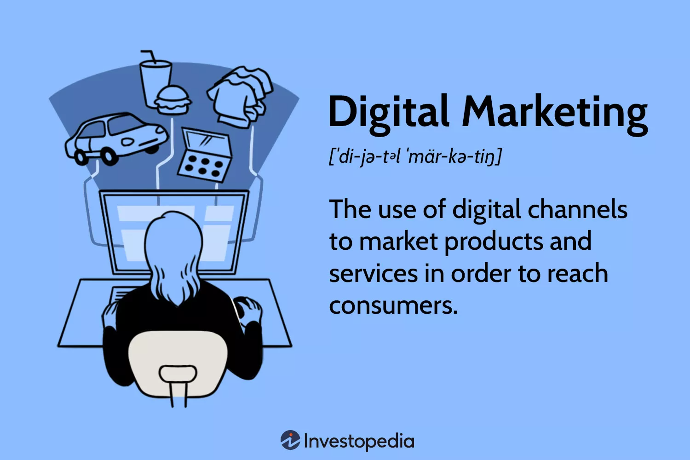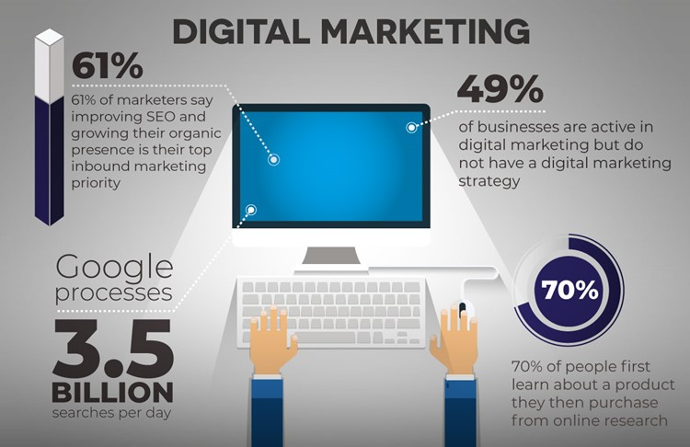In today's interconnected world, where consumers are increasingly reliant on digital channels for information, entertainment, and commerce, businesses must adapt their marketing strategies to remain competitive. Enter digital marketing – a dynamic and multifaceted approach to reaching and engaging with target audiences online. But what exactly is digital marketing, and why is it essential for modern businesses? In this comprehensive guide, we'll explore the fundamentals of digital marketing, its key components, and its transformative impact on the way brands connect with customers.
Defining Digital Marketing

At its core, digital marketing encompasses all marketing efforts that utilize digital channels and technologies to promote products or services. Unlike traditional marketing, which relies primarily on offline mediums such as print ads, television commercials, and direct mail, digital marketing leverages the internet, mobile devices, social media platforms, search engines, and other digital channels to reach target audiences.
Key Components of Digital Marketing
1. Search Engine Optimization (SEO)
SEO involves optimizing a website's content and structure to improve its visibility and ranking on search engine results pages (SERPs). By optimizing for relevant keywords and enhancing factors such as site speed, mobile-friendliness, and user experience, businesses can attract organic traffic and increase their online visibility.
2. Content Marketing
Content lies at the heart of digital marketing. Content marketing involves creating and distributing valuable, relevant, and engaging content to attract and retain a target audience. This content can take various forms, including blog posts, articles, videos, infographics, podcasts, and social media posts. By providing informative and entertaining content, brands can establish authority, build trust, and drive customer engagement.
3. Social Media Marketing
Social media platforms have become integral to digital marketing strategies. Social media marketing involves using social networks like Facebook, Instagram, Twitter, LinkedIn, and TikTok to connect with audiences, build brand awareness, and drive engagement. Brands can share content, interact with followers, run targeted advertising campaigns, and monitor conversations to understand customer preferences and sentiments.
4. Email Marketing
Email remains one of the most effective channels for nurturing leads and driving conversions. Email marketing involves sending targeted messages to a subscriber list to promote products, deliver personalized offers, provide updates, and maintain ongoing communication with customers. With advanced automation tools, businesses can create highly segmented and personalized email campaigns to deliver the right message to the right audience at the right time.
5. Pay-Per-Click (PPC) Advertising
PPC advertising enables businesses to display ads on search engines and other platforms and pay a fee each time a user clicks on their ad. Platforms like Google Ads and Bing Ads allow advertisers to bid on keywords relevant to their business and target specific demographics, interests, and behaviors. PPC campaigns can drive targeted traffic to a website, generate leads, and increase conversions when executed effectively.
6. Analytics and Data Insights
Data-driven decision-making is a cornerstone of digital marketing. By leveraging analytics tools like Google Analytics, businesses can track website traffic, user behavior, conversion rates, and other key metrics to measure the performance of their digital marketing efforts. Insights derived from data analysis enable marketers to refine their strategies, optimize campaigns, and allocate resources more effectively.

Want you business to go digital?
Just push the button and we'll take you through.
The Benefits of Digital Marketing
1. Increased Reach
Digital marketing enables businesses to reach a global audience regardless of geographical boundaries. With the proliferation of internet-connected devices, brands can engage with consumers across multiple channels and platforms, expanding their reach and market presence.
2. Targeted Advertising
Unlike traditional advertising, which often casts a wide net, digital marketing allows for precise targeting based on demographics, interests, behaviors, and other criteria. This targeted approach ensures that marketing messages resonate with the right audience, maximizing the effectiveness of campaigns and minimizing wasted ad spend.
3. Cost-Effectiveness
Digital marketing offers a range of cost-effective options for businesses of all sizes. Compared to traditional advertising channels, digital platforms typically have lower barriers to entry and allow for greater flexibility in budget allocation. With careful planning and optimization, businesses can achieve significant ROI from their digital marketing investments.
4. Measurable Results
One of the most significant advantages of digital marketing is its measurability. Unlike traditional marketing methods, which can be challenging to track and quantify, digital marketing provides real-time analytics and insights into campaign performance. Marketers can monitor key metrics, such as website traffic, conversion rates, click-through rates, and return on ad spend (ROAS), and adjust their strategies accordingly to achieve desired outcomes.
5. Improved Customer Engagement
Digital marketing facilitates meaningful interactions with customers throughout their buyer journey. Whether through social media engagement, personalized email communications, or interactive content experiences, brands can foster deeper connections with their audience, building loyalty and driving repeat business.
Conclusion
In an increasingly digital world, mastering the fundamentals of digital marketing is essential for businesses looking to thrive in the competitive landscape. By understanding the key components of digital marketing and harnessing its power to reach, engage, and convert target audiences, businesses can unlock new opportunities for growth, innovation, and success. Embracing digital marketing isn't just a choice – it's a strategic imperative for businesses seeking to stay ahead of the curve and drive meaningful results in the digital age.
So, are you ready to elevate your digital marketing game and unlock the full potential of your business online? Let Techwaresoft be your trusted partner in navigating the complexities of digital marketing.
Take the first step towards digital marketing success today.
Contact us today to discover how our tailored solutions can help you reach your marketing goals and drive success in the digital age.
Other resources: How To Build a Marketing Agency
What is Digital Marketing: Understanding the Basics